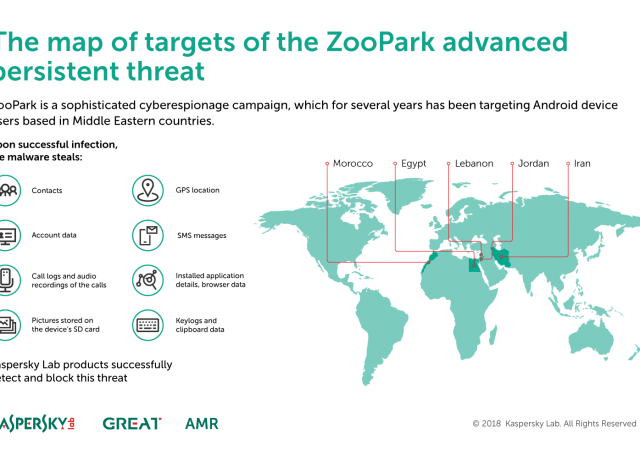Don’t let easy-going holiday shopping hinder your vigilance The time of unrestrained shopping has already begun, thanks to Black Friday in November. This is swiftly followed by Christmas and New Year gift giving, and then the January sales. But it…
2018’s malicious crypto-mining fever powered by pirated software and content
The global outbreak in malicious cryptocurrency mining that unfolded in 2018 saw the number of attacks increase by more than 83%, with over five million users attacked online in the first three quarters of the year, compared to 2.7 million…
False sense of security: more than two-thirds of SMBs claim they can protect their data, but almost half suffer data breaches
Despite a lack of resources and funding, growing companies are achieving great efficiencies by using applications to help manage projects, sales and customer service operations. But with customer data a core element of these solutions, are businesses effectively safeguarding it…
WannaCry is still alive hitting almost 75,000 users in Q3 2018
One and a half years after its epidemic, WannaCry ransomware tops the list of the most widespread cryptor families and the ransomware has attacked 74,621 unique users worldwide. These attacks accounted for 28.72% of all users targeted by cryptors in…
Trojan found in fake Telegram app
Kaspersky Lab researchers have discovered a wave of cyber-espionage targeted attacks aimed at Central Asian diplomatic organizations. The Trojan called “Octopus”, disguised as a version of a popular and legitimate online messenger, was attracting users amid the news of a…
How remote legitimate administration tools (RATs) bring unexpected threats to industrial networks
Legitimate remote administration tools (RAT) pose a serious threat to industrial networks: they are installed on 31.6% of industrial control system (ICS) computers, but often remain unnoticed until the organization’s security team finds out that criminals have been using a…
Research from Kaspersky Lab reveals how vulnerable we can be when losing our connection
Imagine being in a foreign country, lost, and with no way of getting in touch with anyone who can help you. Well, when phones or tablets break, when devices run out of battery, or when connections go awry, this is…
LuckyMouse Group strikes again, uses digital certificates to sign Malware
The Kaspersky Lab Global Research and Analysis Team (GReAT) has discovered several infections from a previously unknown Trojan, which is most likely related to the infamous Chinese-speaking threat actor – LuckyMouse. The most peculiar trait of this malware is its…
Cyberattacks targets over 40% of control systems used in large industries
More than 40% of all industrial control system (ICS) computers protected by Kaspersky Lab solutions were attacked by malicious software at least once during the first half of 2018. The most impacted countries turned out to be Vietnam, Algeria and…
73% of successful corporate network penetration tests in 2017 broke in through vulnerable web apps
An analysis of penetration tests conducted by Kaspersky Lab researchers on corporate networks during 2017 reveals that three-quarters (73%) of successful perimeter breaches were achieved using vulnerable web applications. The findings are summarized in a new report, ‘Security assessment of…
Concerns on the rise about mobile apps watching and tracking users, finds Kaspersky Lab
The monitoring capabilities of mobile apps are becoming a concern for users, many of whom are worried that the apps on their connected devices might be able track them down, watch what they’re doing, or share their data. But these dangers could…
From cloud growth to a cloud mess: two out of three SMBs struggle with over-complicated IT infrastructure
While Cloud Services do bring about many conveniences and opportunities, there are negative effects associated with them as well. Loss of control over application security and valuable client data Lack of control and visibility As more IT infrastructures in organizations…
Pet trackers might have more ‘bite’ than animal lovers realize, says Kaspersky Lab
Pet trackers might have more ‘bite’ than animal lovers realize, says Kaspersky Lab As everything, including our pets, begin to take on a digital element, securing connected devices and their networks will be key to keeping, not just our information,…
Roaming Mantis extends DNS hijacking attacks from Asia to rest of world, adds crypto-mining
Roaming Mantis extends DNS hijacking attacks from Asia to rest of world, adds crypto-mining On 16 April, Kaspersky Lab researchers reported on a new Android malware distributed through a domain name system (DNS) hijacking technique and targeting mainly smartphones in Asia. Four weeks…
Kaspersky Lab DDoS Intelligence quarterly report: amplification attacks and old botnets make a comeback
Kaspersky Lab DDoS Intelligence quarterly report: amplification attacks and old botnets make a comeback Kaspersky Lab has published its report looking at botnet-assisted DDoS attacks for the first quarter of 2018. The company’s experts note an increase in activity by…













